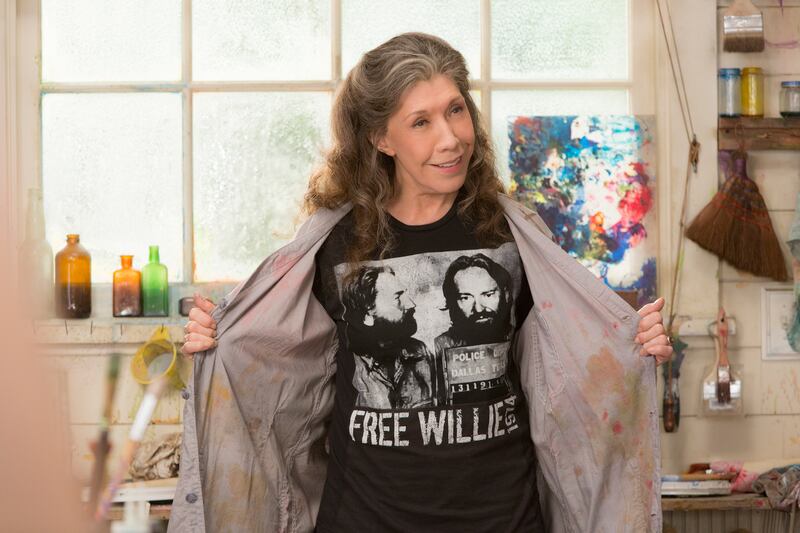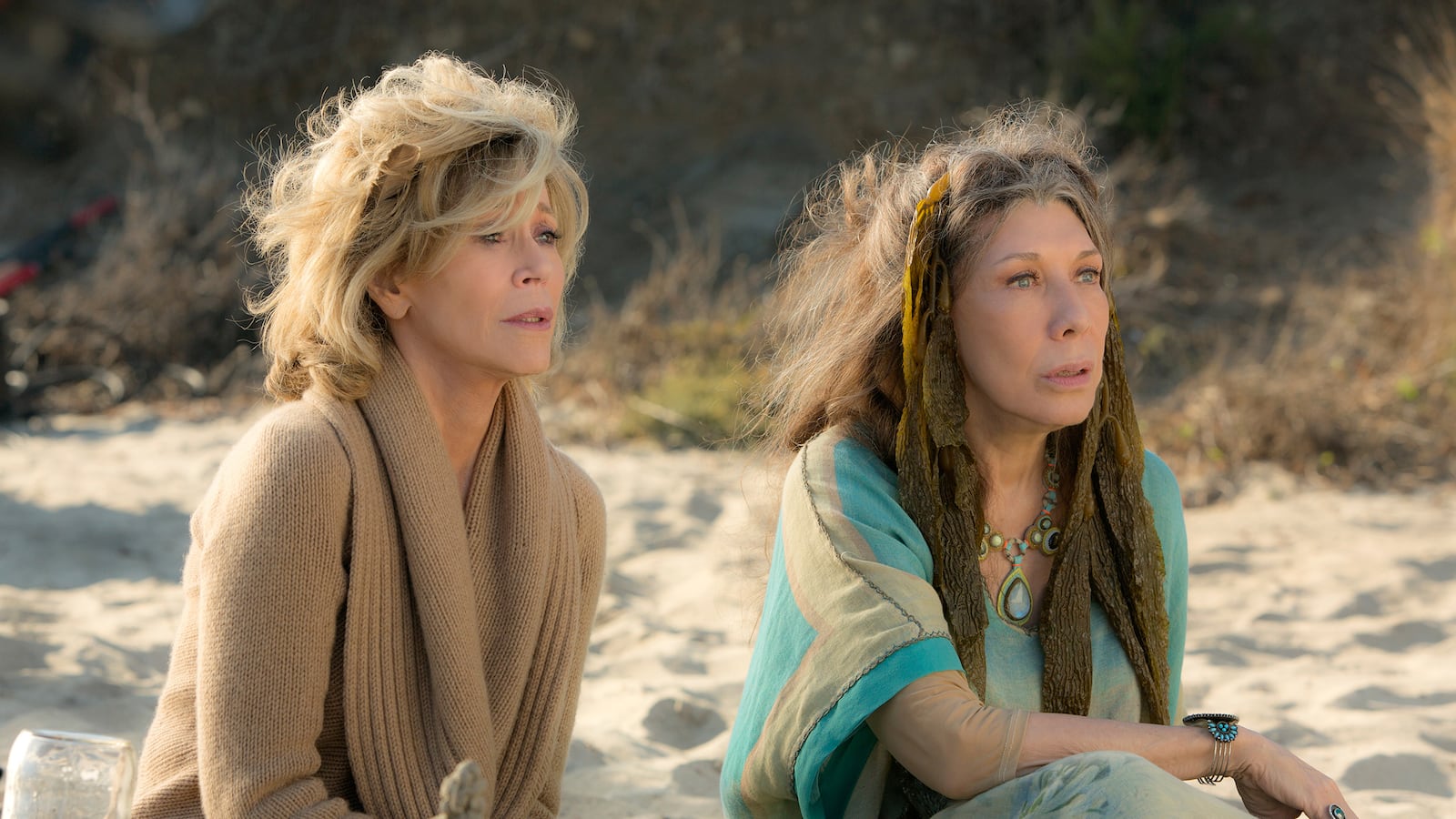When Jane Fonda and Lily Tomlin, two of the most fabulous, assured, and talented actresses alive, are cast as leads in a new Netflix comedy, the show could just be footage of the duo sipping tea and we’d be on board immediately. In fact, the first episode Grace and Frankie climaxes with just that: Fonda and Tomlin drinking tea together. (It just so happens that the tea has peyote in it.)
That’s the biggest strength of Grace and Frankie, the first season of which is available to stream in its entirety Friday. Strangely, it’s also its biggest weakness.
It is an unparalleled delight to see Fonda and Tomlin—at a stage in their careers Hollywood is notoriously inhospitable to—play off each other in a television series. The problem is that the show relies far too heavily on that novelty, dressing it up with the occasional dated sitcom gag instead of enriching it with the things Netflix series have become known for: audacious perspective, confidence in tone, and unmistakable voice.
The series is certainly funny, and any show in which Fonda and Tomlin perform roles with this much energy and commitment is worth a binge. But as much as their characters, Grace and Frankie, spend the majority of the series’ early episodes trying to find themselves and decide the kind of attitude they want to put forth to the world, the show that bears their name is going through the same struggle. It doesn’t seem to know what it wants to be.
Maybe that’s to be expected. Grace and Frankie was created by two titans of the ‘90s multi-camera, laugh track sitcom era: Marta Kauffman (Friends) and Howard J. Morris (Home Improvement). Both are charging valiantly into the world of single-camera dramedies and streaming services.
The premise on its own is straight-up sitcom fodder, and as batty as you’d hope a comedy starring Fonda and Tomlin would be. Two women whose husbands are law partners have hated each other for decades, but are thrown together in merciless bonding when those husbands declare that they have been having an affair with each other for 25 years and, now that same-sex is marriage is legal, would be getting married.
That royally wacky tagline, attached to Queens Jane and Lily, had their worshippers salivating at the high-concept, high-comedy that would certainly follow. They’ll be shocked to find, then, how often Grace and Frankie is so muted.
At times the restraint is as admirable as it is unexpected. This series treats the life-altering experience somberly, with Grace and Frankie going through stages of grief more than they engage in hijinks. Even the peyote scene is superficially wild—it’s a far more spiritually intense moment than it is broadly comedic.
It’s certainly respectable that this isn’t the balls-out Grandmas Gone Wild comedy some of us might have expected or hoped for. It makes for a richer showcase of the range of Tomlin and Fonda’s talents, and it’s a treat to see them play fully realized, complicated characters instead of the hysterical caricatures of old ladies they’ve been so often reduced to later in their careers. And the two bring a fair share of Lucy and Ethel bit comedy to ham up the proceedings and accentuate their naturally comedic deliveries.
Grace and Frankie has all the ambition of a Louie or a Transparent, a character study that ably blends gravitas with humor. But with one too many dated sitcom gags squeaking by, you end up wondering where the laugh track is—or, more likely, why Kaufman and Morris were tempted to go so broad in the first place.
The show does, however, have the luxury of Fonda and Tomlin as Grace and Frankie, two actresses nimble enough to imbue both the sincerity and the shtick with lived-in relatability and confidence.
They’re both playing on their public personas. Tomlin’s Frankie is a spiritualist who traipses around in kaftans, goes on “vision quests,” and has a shrine in her beach house. Fonda’s Grace micromanages brunch spreads, doesn’t eat carbohydrates, and, in her big pilot scene, strips herself in front of a mirror by removing her fake lashes and hairpieces.
When Grace and Frankie realize they need each other for support and move in together, an Odd Couple dynamic takes over the show and leads to its strongest moments.
Complementing—and more often, opposing—that most classic of sitcom setups is the downright psychological rumination that leads the rest of the series, with Grace, Frankie, and their children talking through their thoughts and emotions as they grapple with Martin Sheen’s Robert and Sam Waterston’s Sol’s coming out and marital betrayal.
“How do I tell the woman I’ve loved for 40 years that I can’t be with her? I want to be happy,” Sol says. “You don’t. Ride out the clock. Stay miserable,” Frankie says back.

In a parallel scene, Robert asks Grace, “Were you ever really happy with me?” She replies, “I was happy enough. So we didn’t have the romance of the century, but I thought we were normal. I thought we were like everybody else. That this was life.”
“I thought there was more,” Robert replies. Then Grace: “It’d be easier if you’d died.”
This is great dialogue. Sol tells Frankie, “You’ve always loved me for…” before she interrupts, “Who you are? Ironic isn’t it.” An engaging amount of pathos is mined from these wounded characters, and their interplay with each other and their husbands. But it’s also jarring that it’s bookended by a shellfish food fight at a restaurant played for cheap laughs and a reaching gag about Jane Fonda sitting on a chair with Ryan Gosling’s face on it.
The pendulum swing of tone and genre is a running issue with the series, and it’s so drastic and sharp that any episode leaves you susceptible to tonal vertigo.
A suitably uncomfortable and well-acted episode 3 scene in which Robert and Sol’s kids have dinner together for the first time is another brilliant psychological case study about this peculiar situation. The kids tear their dads a new one for believing that they could be happy for them. If it were women they had been cheating on their mothers with for 20 years, there would be blood on the floor. But because they’re gay and in love, everyone’s expected to share dessert cheerfully together.
The provocative, strong scene is, again, followed by a needlessly over-the-top comic one in which Grace and Frankie have a public meltdown at a grocery store. Like always, they’re funny in it. But it’s hard to get revved up for the comedy when the drama is just as, if not more, interesting.
It’s hard to decide which show I’d rather watch. The dark character study about two women whose lives have exploded, leaving them shell-shocked and picking up the pieces, or the grandmas-do-the-Odd Couple that so many people expected the series to be—and which it tries to be so often.
Paired together, Grace and Frankie doesn’t exactly work. But paired together, Fonda and Tomlin are brilliant. They could make anything worth watching. And they make this, issues aside, more than worth your while.






